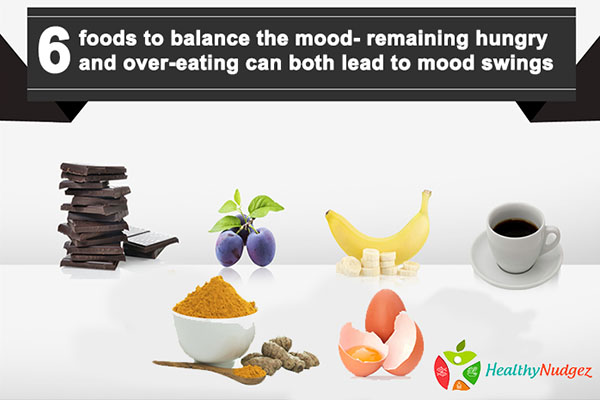6 foods to balance the mood – remaining hungry and over-eating can both lead to mood swings
Researchers have proven that both, remaining hungry over a long period of time and over-eating, can lead to mood swings and depression. Many studies conducted have also shown that people who remain hungry, due to any reason are more susceptible to depression and mood swings, they are also at risk of attempting suicide.
Some nutritional factors that may cause mood swings or that lead to depression are:
- Nutritional deficiencies: Deficiencies such as iron, vitamin B 12 and folate deficiencies lead to anemia, which leads to fatigue and depression. Unhealthy foods (read fast and fad foods), having poor nutritional quality, which lack in proteins, vitamins, minerals and fiber can also cause mood swings. Restrictive diet in certain diseases, such as in Intestinal Bowel Syndrome or on crash diet for sudden weight loss, may also lead to vitamin and mineral deficiencies leading to mood swings
- Blood Sugar levels: Sugar is great mood regulator, but it works only temporarily. Blood sugar peaks and troughs (highs and lows) as caused in diabetes, can both cause sudden changes in mood and behavior of a person. Low and high blood sugar levels are both associated with negative mood states.
- Abnormal feeding behavior: Depression and anxiety go hand in hand with obesity. Depressed mood is also associated with abdominal obesity and double folds in the presence of diabetes. Unhealthy food choices, such as caffeine, nicotine, alcohol, refined carbohydrates, trans fats and sugary foods all tend to imbalance the mood and deteriorate mental health, if taken over a period of time.
- Weight reducing diets: Certain crash diets and fad diets, which people follow, without proper guidance may lead to mood swings. This may be due to the fact that these diet are deficient in certain important nutrients or else may be causing decreased blood sugar levels, which may in turn lead to mood swings.
- Gut Health: The gastro-intestinal tract or the gut produces a hormone serotonin, which is an important mood regulator. Functional gut disorders such as constipation, diarrhea or Irritable bowel syndrome can all cause mood fluctuations. Also, changes in the gut flora due to any reason, may also affect mood.
- Other Factors: Other factors such as stress and anxiety may also lead to mood swings. Constant stress effects a person’s ability to regulate emotions and mood. Getting enough sleep, physical activity and a balanced diet help to relive stress and reduce mood swings.
5 foods that help the mood are:
- Liquids: Dehydration may lead to irritability and fatigue causing depression and mood change. Keeping one hydrated with lots of water and other non sugary drinks is important to avoid mood swings.
- Carbohydrates: Despite persistent myths, carbohydrates do not make one fat, if one chooses the correct quality and quantity of carbohydrates. It is advisable to include complex high fiber carbohydrate foods such as whole grains, unprocessed cereals , fresh fruits and vegetables in daily diet. This is because carbohydrates promote the production of serotonin, the feel good hormone.
- Fresh foods and vegetable: Fresh fruits and vegetables are rich in antioxidants and are therefore, associated with lower risk of depression. Also fruits and vegetables, such as beans, spinach and citrus fruits are rich in vitamin B, C, folate and fiber . These reduce the risk of anemia and gastrointestinal diseases which may lead to mood swings and depression.
- Nuts and other omega-3 rich foods: Nuts are packed with proteins, fiber and healthy fats (omega-3), which have a positive effect on a person’s mental health. Other foods that are rich in omega-3 fatty acids are oily fatty fish (such as sardines, tuna and salmon) and flaxseeds, which help to fight depression.
- Probiotics and prebiotics for good gut health: Including curd, yogurt, sprouts, beans, lentils and some fermented foods in the daily diet is good for the gut flora and so a healthy gut. Studies have shown that healthy gut flora can have a positive impact on mood.
- Chocolate or cocoa drinks: Cocoa contains polyphenols, a type of antioxidants, which are mood boosters. Those who consumed limited quantities of dark chocolate or drank cocoa drinks on a daily basis are calmer, have lesser mood swings and are more content.
Recommendations to avoid mood swings are:
- Maintain a stable blood sugar level, which means following a small and frequent meal pattern with 3 main meals and 2 to 3 fiber rich snacks. Do not skip meals especially breakfast
- Remain hydrated. Drink plenty of water and other non calorie liquids such as lemon water, buttermilk, coconut water or green tea.
- Include a minimum of 25-35gm of fiber in the daily diet in order to maintain a healthy gut.
- Do not follow an extremely low-fat diet or a low-carb diet for quick weight loss. Include healthy fats and complex carbohydrates in diet. While reducing weight, go for a balanced high fiber diet rather than a crash diet.
- Avoid packaged and processed foods. It is better to eat fresh.
- Avoid or at least limit use of caffeine, nicotine and alcohol.
- Follow a daily exercise regime of 30-40 minutes per day minimum of 5 days a week.

